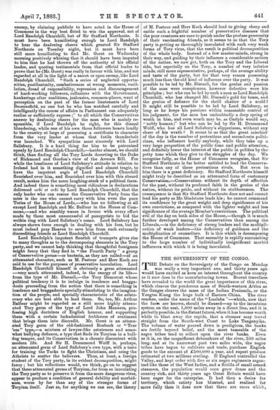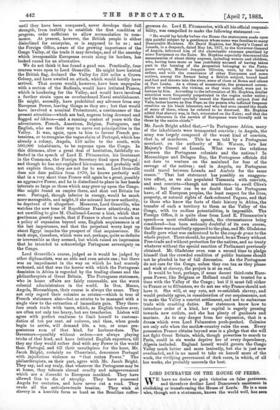THE SOVEREIGNTY OF THE CONGO.
THE Debate on the Sovereignty of the Congo on Monday was really a very important one, and thirty years ago would have excited as keen an interest throughout the country as it now does in the manufacturing towns. Recent travellers- have revealed to the world the great importance of this river, which cleaves the ponderous mass of South-western Africa as. the Ganges cleaves the mass of the Indian Peninsula, or the- Yangtse Kiang the huge bulk of Eastern China. The river reaches, under the name of the "Lualaba "—which, now that the facts are known, should be disused—up to the lacustrine system on the east, 1,800 miles away in a direct line, and it ia perfectly possible, in the distant future, when it has become worth. while to blast away the rapids, that a steamer may travel straight from the South-west Coast to Lake Tanganyika. The volume of water poured down is prodigious, the banks are fertile beyond belief, and the most tameable of the negro tribes tend to collect upon the river banks. Even as it is, on the magnificent debouchure of the river, 350 miles long, and at its narrowest part two miles wide, the negro tribes have begun to cultivate and trade, purchase English goods to the amount of £500,000 a year, and export produce estimated at two millions sterling. If England controlled the Valley, and kept order with five or six negro regiments organ- ised like those of the West Indies, and a flotilla of small armed, steamers, the population would soon grow dense and the country rich, and thirty years ago Great Britain would have been eager for the enterprise. It had then a desire for territory, which satiety has blunted, and realised far more fully than it does now that there are races which,
until they have been conquered, never develope their full strength, from inability to establish the first condition of progress, order sufficient to allow accumulation to com- mence. At present, however, the British people is either disinclined for enterprise, or is supposed to be so ; and the Foreign Office, aware of the growing importance of the Congo Valley, of the trade it may develope, and of the anarchy which irresponsible Europeans create along its borders, has looked round for an alternative.
We do not think it has found a good one. Practically, four courses were open to Lord Granville. He might have hoisted the British flag, declared the Valley for 350 miles a Crown Colony, and have awaited an attack, which would hardly have arrived. That course would, however, have been unpopular with a section of the Radicals, would have irritated France, which is hankering for the Valley, and would have involved a further strain upon an overburdened Naval establishment. He might, secondly, have prohibited any advance from any European Power, leaving things as they are ; but that would have involved a nominal Protectorate, a continuance of the present atrocities—which are bad, negroes being drowned and flogged ad libitum—and a running contest of years with the adventurers, French, American, Belgian, Portuguese, and English, who see their way to carve out principalities in the Valley. It was, again, open to him to favour French pre- tensions, or to recognise the vague claim of Portugal, which has already a colony, Angola, 150 miles to the south, with 500,000 inhabitants, to be supreme upon the Congo. In this dilemma, after a great deal of hesitation, faithfully re- flected in the speech of Lord E. Fitzmaurice, his lieutenant in the Commons, the Foreign Secretary fixed upon Portugal ; and though he has not explained his reasons, and probably will not explain them, they are not far to seek. Lord Granville does not date politics from 1870, he knows perfectly well that in a very short time France will again be a great, possibly an aggressive Power, and he is disinclined to place in her hands interests so large as those which may grow up upon the Congo. She might found an empire there, and shut out Britain for ever. Portugal, though inferior in energy, would be much more manageable, and might, if she misused her new authority, be deprived of it altogether. Moreover, Lord Granville, who watches the new tone of Republican France attentively, was not unwilling to give M. Challemel-Lacour a hint, which that gentleman greatly needs, that if France is about to embark on a policy of expansion beyond seas, English acquiescence is of the last importance, and that the perpetual worry kept up about Egypt impedes the prospect of that acquiescence. He took steps, therefore, which were not, perhaps, quite so definite or irreversible as they seemed, but which raised an impression that he intended to acknowledge Portuguese sovereignty on the Congo.
Lord Granville's course, judged as it would be judged by other diplomatists, was an able and even astute one ; but there was an impediment in the way on which he had scarcely reckoned, and that was the horror with which the Portuguese dominion in Africa is regarded by the trading classes and the philanthropists of Great Britain. The Portuguese statesmen, who in home affairs are fairly reasonable, are the worst colonial administrators in the world. In Goa, Macao, Angola, Mozambique, their course is always the same. They not only regard their colonies as estates—which is true of French statesmen also—but as estates to be managed with a single view to the extraction of immediate gain. They there- fore crush trade with taxes, which, as English traders aver, are often not only too heavy, but are treacheries. Lisbon will agree with perfect readiness to limit herself to customs- duties of ten per cent. ad valorem, and then, when goods begin to arrive, will demand 50s. a ton, or some pre- posterous sum of that kind, for harbour-dues. The Governors—possibly without orders—are always playing tricks of that kind, and have irritated English exporters, till they say they would rather deal with any Power in the world than Portugal, and till their mouthpiece for the hour, Mr. Jacob Bright, certainly no Chauvinist, denounces Portugal with injudicious violence as "that rotten Power." The philanthropists, on their part, agree with Mr. Jacob Bright. They say, and say truly, that whatever the Portuguese may be at home, they tolerate abroad cruelty and misgovernment which are a discredit to European mankind. They have
allowed Goa to die of atrophy. They have possessed Angola for centuries, and have never cut a road. They evade all the anti-slave-trade treaties. They wink at slavery in a horrible form as hard as the Brazilian coffee- growers do. Lord E. Fitzmaurice, with all his official responsi- bility, was compelled to make the following statement :-
" He would lay briefly before the House the statements made upon this painful subject by a gentleman whose name was familiar to many Honourable Members. Mr. David Hopkins, her Majesty's Consul at Loanda, in a despatch, dated May 1st, 1877, to the Governor-General of Angola, informed him of the abominable excesses practised by some Europeans on the Zaire. Mr. Hopkins especially denounced the assassination of about thirty negroes, including women and children, who, having been more or less justifiably accused of having taken part in the burning of the properties belonging to the Portu- guese subject, Manoel Joaquin Oliveira, were, by the latter's orders, and with the connivance of other Europeans and some natives, among the former being a British subject, bound hand and foot and thrown into the river, some of them at Boma and others at Port Lenha. As a climax of monstrosity, the presumed accom- plices or witnesses, the victims, as they were called, were put to torture by him. According to the information of Mr. Hopkins, similar atrocities were frequently perpetrated in the region under notice ; and the same Consul specially named the Spanish subject Jose del Valle, better known as Don Pope, as the person who inflicted frequent cruelties on his black labourers, and who had even caused the death of some of them, whom he ordered to be drowned. Mr. Hopkins added that slavery was, in fact, reinstated on the Zaire; and that the black labourers in the service of Europeans were literally sold to these by the native chiefs."
Mr. Jacob Bright added that,—" In Portuguese Africa, many of the inhabitants were transported convicts ; in Angola, the army was largely composed of the worst kind of convicts, that is, of murderers. This he was told by a Portuguese merchant, on the authority of Mr. Watson, late her Majesty's Consul at Loanda. What were the relations between the Portuguese colonists and the natives ? In Mozambique and Delagoa Bay, the Portuguese officials did not dare to venture on the mainland for fear of the revenge of the natives ; and in Angola, Ina Portuguese could travel between Loanda and Ambriz for the same reason." That last statement has possibly an exaggera- tive effect, as we also populated Tasmania with convicts, and sent convicts—though not murderers—to swell Clive's ranks ; but there can be no doubt that the Portuguese have, of all European peoples, the least respect for the lives, property, or natural rights of dark-coloured Pagans, and that to those who know the facts of their history in Africa, the transfer of such a territory to them as the Valley of the Congo, with its endless potentialities, is impossible. The Foreign Office, it is quite clear from Lord E. Fitzmaurice's speech—a most creditable speech, the circumstances being considered—has been seriously doubtful of its own course, the House was manifestly opposed to the plan, and Mr. Gladstone finally gave what was understood to be the coup de grace to the whole project. There should, he promised, be no Treaty without Free-trade and without protection for the natives, and no treaty whatever without the special sanction of Parliament previously obtained. Mr. Gladstone even rose a second time to pledge himself that the crowded condition of public business should not be pleaded in bar of full discussion. As the Portuguese do not care for the Congo, unless they can tax as they please and wink at slavery, the project is at an end.
It would be best, perhaps, if some decent third-rate Euro- pean Power, like Belgium or Holland could be trusted for a time with the Valley of the Congo ; but if it must fall either to France or to filibusters, we do not see why France should not have it. She will, at any rate, not re-establish slavery, and would probably agree, in consideration of our acquiescence, not to make the Valley a convict settlement, and not to embarrass trade with crushing duties. Her statesmen know how to introduce order of a kind, her capital is eagerly pressing towards new outlets, and she has plenty of gunboats and marines. As to any danger from her expansion, that is a dream which even Lord Palmerston pooh-poohed. Colonies are only safe when the mother-country rules the seas. Every possession France obtains beyond seas is a pledge that she will not fight Great Britain, which, though powerless to march to Paris, could in six weeks deprive her of every dependency, Algeria included. England herself would govern the Congo Valley much better and more leniently, but she is just now overloaded, and in no mood to take on herself more of the work, the vivifying government of dark races, in which, of all her works, she probably succeeds the best.



































 Previous page
Previous page